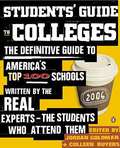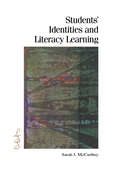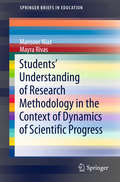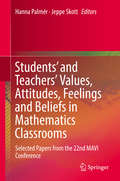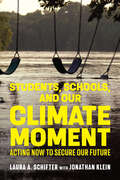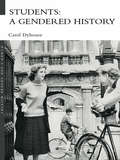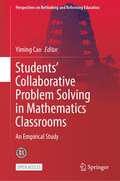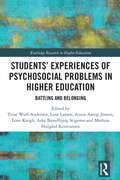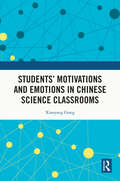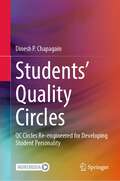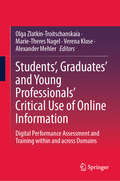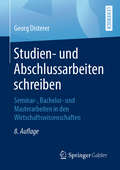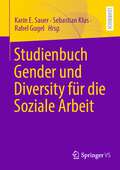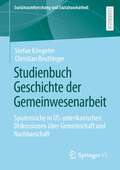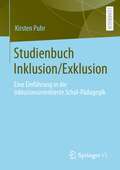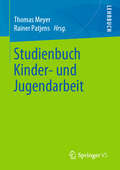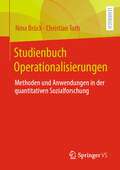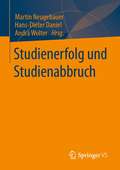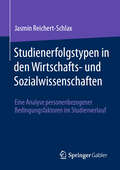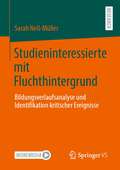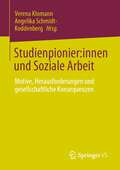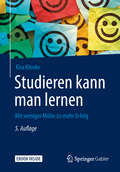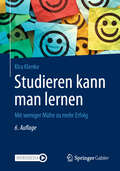- Table View
- List View
Students' Guide To Colleges
by Jordan Goldman Cilleen BuyersCollege guides are a must for any teenager trying to choose the right school. Unfortunately, most guidebooks are vague, boring tomes written by administrators and journalists, instead of the real experts–the college students that actually go there. Students’ Guide to Colleges is different. Entirely student-written and edited, this invaluable resource cuts through the cant with comprehensive listings of the vital statistics and requirements for America’s top 100 schools accompanied by three totally honest, fresh, fun-to-read descriptions penned by attending undergrads from different walks of life. Want to know how big classes really are? How rigorous the academics get? Or how greek or granola, chill or up-tight, homogenous or diverse, gay or straight, a campus really is? Lively, irreverent, and insightful, the Students’ Guide to Colleges is the only guidebook that offers multiple perspectives on each school and tells it like it is so that college applicants can make the best choice when deciding where they want to spend their college years. More than 30,000 students surveryed Preface by Chuck Hughes, former seniior dean of admissions at Harvard University .
Students' Identities and Literacy Learning: Students' Identities And Literacy Learning (IRA's Literacy Studies Series)
by Sarah J. McCarthey IraEducators will find in this book an opportunity to examine the multiple, dynamic identities of the students they instruct and to consider the ways in which all teachers and students are shaped by their social and cultural settings. The volume is the first to examine theories of identity and elementary literacy practices by presenting data in a teacher-friendly format. The chapters highlight the influences of school and, to some extent, home contexts on students' identities as readers and writers, and give numerous implications for practice. McCarthey collected data from three sites in which teachers implemented writing workshop and literature-based instruction in grades 3-6. This book focuses on the students in these sites, who were from diverse cultural and social backgrounds. By providing information about the contexts in which students read and wrote, McCarthey demonstrates the power of the teacher-student relationship, the importance of the classroom curriculum, and the influence of parents and peers on students. Published by International Reading Association
Students' Understanding of Research Methodology in the Context of Dynamics of Scientific Progress
by Mansoor Niaz Mayra RivasThis book discusses how to improve high school students'understanding of research methodology based on alternative interpretations of data, role of controversies, creativity andthe scientific method, in the context of the oil drop experiment. These aspects form an important part of thenature of science (NOS). The study reported in this volume is is based on a reflective, explicit and activity-based approach to teachingnature of science (NOS) that can facilitate high school students' understanding of how scientists elaborate theoreticalframeworks, design experiments, report data that leads to controversies and finally with thecollaboration of the scientific community a consensus is reached. Most students changed their perspective and drew concept maps in whichthey emphasized the creative, accumulative, controversialnature of science and the scientific method.
Students' and Teachers' Values, Attitudes, Feelings and Beliefs in Mathematics Classrooms: Selected Papers from the 22nd MAVI Conference
by Hanna Palmér Jeppe SkottThis contributed volume is an exciting product of the 22nd MAVI conference, which presents cutting-edge research on affective issues in teaching and learning math. The teaching and learning of mathematics is highly dependent on students’ and teachers’ values, attitudes, feelings, beliefs and motivations towards mathematics and mathematics education. These peer-reviewed contributions provide critical insights through their theoretically and methodologically diverse analyses of relevant issues related to affective factors in teaching and learning math and offer new tools and strategies by which to evaluate affective factors in students’ and teachers’ mathematical activities in the classroom. Among the topics discussed: The relationship between proxies for learning and mathematically related beliefs.Teaching for entrepreneurial and mathematical competences.Prospective teachers’ conceptions of the concepts mean, median, and mode.Prospective teachers’ approach to reasoning and proofThe impact of assessment on students’ experiences of mathematics. Through its thematic connections to teacher education, professional development, assessment, entrepreneurial competences, and reasoning and proof, Students' and Teachers' Values, Attitudes, Feelings and Beliefs in Mathematics Classrooms proves to be a valuable resource for educators, practitioners, and students for applications at primary, secondary, and university levels.
Students, Colleges, and Disability Law
by Stephen B. ThomasThis text examines the obligations and rights of students with disabilities and the institutions they attend in higher education, including guidelines for university administrators.
Students, Places and Identities in English and the Arts: Creative Spaces in Education (National Association for the Teaching of English (NATE))
by David Stevens Karen LockneyIn an age when national identities are a subject of popular debate, along with issues of place in relation to immigration, displacement and mobility, it is particularly important that educators are supported in their reflections on how best to respond to such pertinent issues in their daily practice. This book accessibly and sensitively explores the ways in which teachers can work with places and identities in English and related expressive arts to create a rich experience for students in schools and beyond. A team of carefully selected contributors present practical ideas and critically examine diverse contexts and viewpoints. Exploring the significance of identity and place in education, the central notion is that language and arts are vital to enhancing understanding and empathy. The book provides an approach that offers teachers and other professionals ways to engage critically with these themes, as well as practical strategies for opening up debate and creative work in a broad range of curriculum areas. This insightful book will be of interest to teachers, teacher educators, training teachers and researchers in education.
Students, Schools, and Our Climate Moment: Acting Now to Secure Our Future
by Laura A. Schifter Jonathan KleinA call to action that promotes K–12 schools and students as key contributors to climate solutions
Students: A Gendered History (Women's and Gender History)
by Carol DyhouseThis compelling and stimulating book explores the gendered social history of students in modern Britain. From the privileged youth of Brideshead Revisited, to the scruffs at 'Scumbag University' in The Young Ones, representations of the university undergraduate have been decidedly male. But since the 1970s the proportion of women students in universities in the UK has continued to rise so that female undergraduates now outnumber their male counterparts. Drawing upon wide-ranging original research including documentary and archival sources, newsfilm, press coverage of student life and life histories of men and women who graduated before the Second World War, this text provides rich insights into changes in student identity and experience over the past century. The book examines : men's and women's differing expectations of higher education the sacrifices that families made to send young people to college the effect of equality legislation demography changing patterns of marriage and the impact of the 'sexual revolution' on female students the cultural life of students and the role that gender has played in shaping them. For students of gender studies, cultural studies and history, this book will have meaningful impact on their degree course studies.
Students’ Collaborative Problem Solving in Mathematics Classrooms: An Empirical Study (Perspectives on Rethinking and Reforming Education)
by Yiming CaoThis open access book provides key insights into the social fundamentals of learning and indications of social interactive modes conducive and restrictive of that learning in China. Combining theoretical and technical advances in an innovative research design, this book focuses on collaborative problem solving in mathematics to increase the visibility of social interactions in teachers’ designing, students’ learning and teachers’ instructional intervention. It also explores students’ cognitive and social interaction as well as teacher intervention in students’ group collaboration.
Students’ Experiences of Psychosocial Problems in Higher Education: Battling and Belonging (Routledge Research in Higher Education)
by Lone Krogh Annie Aarup Jensen Trine Wulf-Andersen Lene Larsen Aske Basselbjerg Stigemo Mathias Hulgård KristiansenAround the world, students in higher education suffer from and deal with psychosocial problems. This phenomenon is universal and seems to be increasing. A vast number of students enter higher education with problems like stress, anxiety or depression, or develop them during their student lives, due to, for example, loneliness, family crisis, mental health or study environment issues. Battling, belonging and recognition are the focal points of this book’s analyses, showing how students faced with psychosocial problems experience high degrees of stigma and exclusion in the academic communities and society as such. The book is based on research situated in a welfare society, Denmark, where students have relatively easy access to higher education and to public support for education as well as special support for students with psychosocial problems. Taking a student perspective, the book provides in-depth, qualitative analyses of what characterizes student life, which specific psychosocial and other problems students experience, how problems are constructed, represented and become significant in relation to studying, and, not least, how students deal with them. It will be of great interest to researchers, academics and postgraduate students in the fields of educational psychology, sociology of education and higher education. It will also be of interest to supervisors and administrators in higher education.
Students’ Motivations and Emotions in Chinese Science Classrooms
by Xiaoyang GongThe book reviews and examines students’ motivations and emotions in Chinese science classrooms. By adopting different approaches such as content analysis, factor analysis, path analysis, and latent profile analysis, the author analyzes the content of literature, curriculum standards and textbooks, classroom observations, survey data, interview data, and open-ended responses from students and teachers through a literature review and six empirical studies. The findings may provide insights for education researchers and practitioners seeking to improve science teachers’ pedagogical practices and create friendlier classroom environments. Researchers of science education or those who are interested in investigating students’ affective perceptions in specific subject contexts will find this book interesting.
Students’ Quality Circles: QC Circles Re-engineered for Developing Student Personality
by Dinesh P. ChapagainThis book explains what Students' Quality Circles (SQC) are, how they function, key constraints and issues in implementation, and possible solutions to make it a valuable co-curricular activity. It showcases how Quality Control Circle (QCC) is reengineered with the sole purpose of prosocial personality development of students at their early age. It is a research outcome which depicts the direction of the education system toward character building rather than only developing knowledge and skills. The logical sequence of presentation of the book is ‘why,’ ‘what,’ and toward the end, ‘how’ SQC in education. The book satisfies four hierarchical levels of readers. The first level is of educationists and national policy makers who may take up SQC as an important approach of the education system in their country for prosocial personality development of students and thereby targeting to produce quality citizens in the future. At the second level are chief executives or managers of educational institutes who may identify the potential of SQC approach for developing the positive personality of their students. Teachers and SQC facilitators are at the third level, and they can use the book to train and educate their students while initiating and promoting SQC activities at their institutes. And finally, at the fourth level obviously are students who may refer to this book from time to time and practice SQC on their own for self-development and empowerment.
Students’, Graduates’ and Young Professionals’ Critical Use of Online Information: Digital Performance Assessment and Training within and across Domains
by Alexander Mehler Olga Zlatkin-Troitschanskaia Marie-Theres Nagel Verena KloseThis book addresses the topic of online information for everyday personal and professional use by students, graduates, and young professionals. It focuses on the development of the job-related use of online information by young professionals in their practical phases of education (traineeship/practical year) in the domains of law, teaching, and medicine. The research conducted in this context investigates the general and domain-specific use of online resources in educational contexts and examines the effectiveness of an innovative digital training approach in enhancing skills required for the competent use of online information. For this purpose, the presented research uses a yet unprecedented approach of data triangulation, in which self-rated data, digitally and in vivo assessed response process data and expert ratings are integrated into a theoretically founded assessment framework and are examined from various interdisciplinary perspectives with different analysis methods. Overall, this work addresses key research questions related to the use of online information in practical tasks as well as to the impact of digital training. It provides in-depth multidisciplinary analyses of multimodal processes and performance data, allowing implications equally relevant for practitioners, policymakers, and researchers in the field of education.
Studien- und Abschlussarbeiten schreiben: Seminar-, Bachelor- und Masterarbeiten in den Wirtschaftswissenschaften (Springer-Lehrbuch)
by Georg DistererDieses Buch hilft Studierenden der Wirtschafts- und Sozialwissenschaften, Studienarbeiten aller Art erfolgreich zu schreiben, also etwa Hausarbeiten und Seminararbeiten sowie Abschlussarbeiten wie Bachelorarbeiten und Masterarbeiten. Detailliert werden die inhaltlichen und formalen Anforderungen an Studienarbeiten beschrieben und die Gründe für formale Regularien in Prüfungsordnungen und Zitierrichtlinien erläutert. Das Buch bietet einen anschaulichen Leitfaden und gibt konkrete Unterstützung in einer prägnanten und verständlichen Darstellung. Die Anforderungen an Studienarbeiten werden auf diese Weise transparent und klar. Durch die im Buch enthaltenen anschaulichen und nützlichen Handlungsanleitungen wird das Anfertigen von Studienarbeiten zu einer interessanten und spannenden Aufgabe.
Studienbuch Gender und Diversity für die Soziale Arbeit
by Karin E. Sauer Sebastian Klus Rahel GugelDas Studienbuch bietet eine ebenso verständliche wie fachlich fundierte Einführung in Grundlagen der sozial- und kulturwissenschaftlichen Gender-, Queer- und Diversity Studies und damit verbundene Problem- und Handlungsfelder für die Soziale Arbeit. Die Auseinandersetzung mit Konzepten und Methoden der diversitätsbewussten Sozialen Arbeit eröffnet zudem Perspektiven des Transfers in die professionelle Praxis. Weitere Möglichkeiten für eine dynamische Beschäftigung mit den Themen finden sich unter http://www.gender-diversity.social/.
Studienbuch Geschichte der Gemeinwesenarbeit: Spurensuche in US-amerikanischen Diskussionen über Gemeinschaft und Nachbarschaft (Sozialraumforschung und Sozialraumarbeit #17)
by Stefan Köngeter Christian ReutlingerDas Studienbuch macht in Originaltexten der US-amerikanischen Debatte zur Bedeutung der ‚Community‘ zentrale Quellen zugänglich, aus denen sich neue Perspektiven auf die Geschichte der Gemeinwesenarbeit ergeben. Die Auseinandersetzung mit den Texten aus den Jahren zwischen 1890 und 1935 ermöglicht Studierenden ebenso wie Fachwissenschaftler:innen einen differenzierten Einblick in die historische Entwicklung des Handlungsfelds Sozialer Arbeit und eine historische Rekonstruktion von heute vergessenen Zusammenhängen und internationalen Verbindungslinien. Durch kurze Analysen und Rahmungen führen die Autoren in den Kontext der englischsprachigen Texte ein und eröffnen dadurch eine eigenständige Spurensuche des historischen Diskurses um Gemeinschaft und Sozialraum.
Studienbuch Inklusion/Exklusion: Eine Einführung in die inklusionsorientierte Schul-Pädagogik
by Kirsten PuhrDas Studienbuch bietet sowohl theoretisch-reflexive Positionierungen zu Theorien und Konzepten inklusionsorientierter Schul-Pädagogik als auch Auseinandersetzungen mit Ansprüchen an, Widersprüchen in sowie Einsprüchen gegen pädagogische und politische Praxen der Inklusion und Exklusion. So eröffnet es Studierenden der Schul-Pädagogik Zugänge zu ausgewählten erziehungswissenschaftlichen, soziologischen, medizinischen, politikwissenschaftlichen, körper- und politikphilosophischen Vorstellungen von Inklusion/Exklusion.
Studienbuch Kinder- und Jugendarbeit
by Thomas Meyer Rainer PatjensDas Lehrbuch richtet sich primär an Studierende der Sozialen Arbeit, vor allem dem Schwerpunkt Kinder- und Jugendarbeit. Neben den Grundlagen zur Kinder- und Jugendarbeit werden die Querschnittsthemen und Praxisansätze ausführlich dargestellt. Darüber hinaus widmet sich die Einführung den Schwerpunkten Schutzauftrag und den sozialwissenschaftlichen Grundlagen. Es vermittelt die notwendigen disziplinären und professionsrelevanten Kenntnisse für die Kinder- und Jugendarbeit, die sowohl zur Vorbereitung auf die Schwerpunktprüfungen als auch für die Praxis grundlegend sind.
Studienbuch Operationalisierungen: Methoden und Anwendungen in der quantitativen Sozialforschung
by Nina Brück Christian TothDas Studienbuch liefert eine Einführung in die komplexen Operationalisierungsverfahren, die für die Analyse psychometrischer Konstrukte und die Konstruktion eines Messinstruments erforderlich sind. Die Autorin und der Autor zeigen die verschiedenen Schritte einer Operationalisierung vor dem Hintergrund eines breiten Begriffsverständnisses auf. Dabei werden die theoretischen Ausführungen durch praktische Beispiele verdeutlicht.
Studienerfolg und Studienabbruch
by Hans-Dieter Daniel Martin Neugebauer Andrä WolterDie Sicherung des Studienerfolgs gehört zu den großen Herausforderungen für Hochschulen: Nach derzeitigen Schätzungen verlassen knapp 30 % aller Bachelorstudierenden die Hochschulen ohne Abschluss. Schon weil es sich um eine quantitativ so bedeutsame Gruppe handelt, sind Fragen nach den Ursachen und Folgen von Studienabbrüchen von hoher Relevanz – für Hochschulen und Bildungsforschung gleichermaßen. Trotz hoher Bedeutsamkeit wurde das Thema Studienabbruch durch die empirische Hochschulforschung bislang vergleichsweise wenig fokussiert. Seit 2017 fördert das Bundesministerium für Bildung und Forschung daher in der Förderlinie „Studienerfolg und Studienabbruch“ 19 (Verbund-)Projekte, um mehr empirisch gesichertes Wissen zum Phänomen Studienabbruch zu generieren. Zum Ablauf der ersten Förderphase werden in diesem Sammelband die zentralen Erkenntnisse der Forschungsprojekte dargestellt.
Studienerfolgstypen in den Wirtschafts- und Sozialwissenschaften: Eine Analyse personenbezogener Bedingungsfaktoren im Studienverlauf
by Jasmin Reichert-SchlaxDurch aktuelle Herausforderungen wie hohe Studierendenzahlen wird es insbesondere in den großen Studiendomänen der Wirtschafts- und Sozialwissenschaften zunehmend schwerer, die Lernbedarfe einzelner Studierender frühzeitig zu identifizieren und diese in der Lehre zu berücksichtigen. Die gleichzeitig starke Heterogenität der Studierendenschaft macht es erforderlich, Wege zu suchen, vulnerablen Gruppen über das generelle Lehrangebot hinaus spezifische Angebote zu machen, um die Studierenden adäquat zu unterstützen und somit ein erfolgreiches Studium zu ermöglichen. Das Erreichen individuellen Studienerfolgs ist schließlich ein zentrales Ziel der Hochschulbildung. Eine einheitliche Definition von Studienerfolg liegt jedoch bis heute nicht vor. Die vorliegende Untersuchung fokussiert zum einen die Bildung von Studienerfolgstypologien im Bachelorstudium unter Einbezug zahlreicher Facetten von Studienerfolg, und zum anderen die Prüfung der bisherigen Forschungsbefunde hinsichtlich personenbezogener Merkmale zur Prädiktion von Studienerfolg und damit zur Identifikation vulnerabler Studierendengruppen. Die Analyse zeichnet sich insbesondere durch das ganzheitliche theoretisch-konzeptuelle Studienerfolgsverständnis aus, das empirisch mittels clusteranalytischer Verfahren einer gemeinsamen Betrachtung zugänglich gemacht wird
Studieninteressierte mit Fluchthintergrund: Bildungsverlaufsanalyse und Identifikation kritischer Ereignisse
by Sarah Nell-MüllerStetig steigende Flüchtlingszahlen stellen Ankunftsnationen vor die Frage, wie sie mit Ankommenden aus Kriegs- und Krisengebieten umgehen möchten. Ein Großteil der Geflüchteten befindet sich zum Fluchtzeitpunkt in einem Alter, in dem die formale Bildungslaufbahn noch nicht abgeschlossen ist. Ferner bestanden in den Herkunftsnationen unterschiedliche Zugangsmöglichkeiten zu formaler Bildung. Bislang konzentrierte sich die Forschung zur Integration von Geflüchteten im Hochschulsektor meist auf die Ankunftssituation. Sarah Nell-Müller identifiziert durch die qualitative Untersuchung von Bildungsverläufen Studieninteressierter mit Fluchthintergrund bestimmte Charakteristika, welche die Bildungsverläufe einer bestimmten Herkunftsgruppe prägen. Sie prüft, ob eine Typologisierung bestimmter Bildungsverläufe erstellt werden kann, welche die Merkmalsheterogenität im Untersuchungsfeld reduziert. Ausgehend vom Modell Bronfenbrenners zur bio-ökologischen Theorie der menschlichen Entwicklung wird ein theoretisches Fundament für die Analyse der Bildungsverläufe von Geflüchteten entwickelt.
Studienpionier: Motive, Herausforderungen und gesellschaftliche Konsequenzen
by Verena Klomann Angelika Schmidt-KoddenbergDer Band untersucht die starke Priorisierung des Studiengangs Soziale Arbeit durch Bildungsaufsteiger*innen als ein soziales Phänomen und leistet einen Beitrag zur zentralen Diskussion. Dabei werden sowohl theoretische Perspektiven aufgegriffen und weiterentwickeln als auch aktuelle empirische Erkenntnisse aus verschiedenen Forschungsprojekten vorgestellt und diskutiert. Darüber hinaus werden auch Einblicke in Formate zur Förderung, Begleitung und Unterstützung sogenannter Studienpionier*innen gegeben.
Studieren kann man lernen: Mit Weniger Mühe Zu Mehr Erfolg
by Kira KlenkeSie möchten den Lernstoff schneller verstehen und besser für die Prüfung behalten? – Dieses Buch präsentiert Ihnen ein praxiserprobtes Selbstcoaching-System, das Sie zuverlässig durchs Studium navigiert. Die Autorin enttarnt gängige Lernmythen und vermittelt Motivationshilfen, Lerntechniken und mentale Tricks, die Sie an der Uni so nicht lernen. Sie zeigt Ihnen, wie Sie sich kraftvoller fühlen, zuversichtlicher und selbstbewusster studieren, Stress und Prüfungsangst reduzieren, effektiver arbeiten und bessere Noten erreichen. Rückmeldungen von Leserinnen und Lesern belegen dies vielfach.Jedes Kapitel startet mit übersichtlichen Lernzielen und endet mit praktischen Tipps für Ihren Studienalltag. Die aktuelle fünfte Auflage erscheint neu mit eBook inside, um Ihren persönlichen Fortschritt auf allen Ebenen noch besser zu unterstützen.
Studieren kann man lernen: Mit weniger Mühe zu mehr Erfolg
by Kira KlenkeLeichter, selbstbewusster und stressfreier lernen mit deutlich besseren NotenSind Sie lustlos und unmotiviert in Ihrem Studium? Oder gehören Sie zu den Arbeitstieren, die unter der Workload vergessen zu leben?Dieser Ratgeber entlarvt irreführende Lernmythen und vermittelt Motivationshilfen, Lerntechniken und mentale Tricks, die Sie so an der Uni nicht lernen. In jedem Kapitel finden Sie auf einen Blick eine Übersicht der Lernziele am Anfang und eine Checkliste mit Tipps für die praktische Umsetzung am Ende.Erfahren Sie, wie Sie• leichter lernen als bisher, motiviert und effektiv,• Glaubenssätze, die Ihr Lernen behindern, aufdecken und upgraden,• Selbstzweifel und Ängste überwinden,• sich motivierend kraftvolle Ziele fürs Studium setzen - und sie auch erreichen,• Schreibhemmungen überwinden und mühelos gute Texte verfassen.Nach dem Erfolg der früheren fünf Auflagen wurde die aktuelle, überarbeitete sechste Auflagedurch Lern-Meditationen ergänzt, abrufbar mit der App SN More Media. Diese Audios führen Sie schnell in einen entspannten Zustand, in dem das Gedankenkarussell im Kopf zur Ruhe kommt, und helfen Ihnen, selbstbewusst, motiviert und leichter zu studieren.
